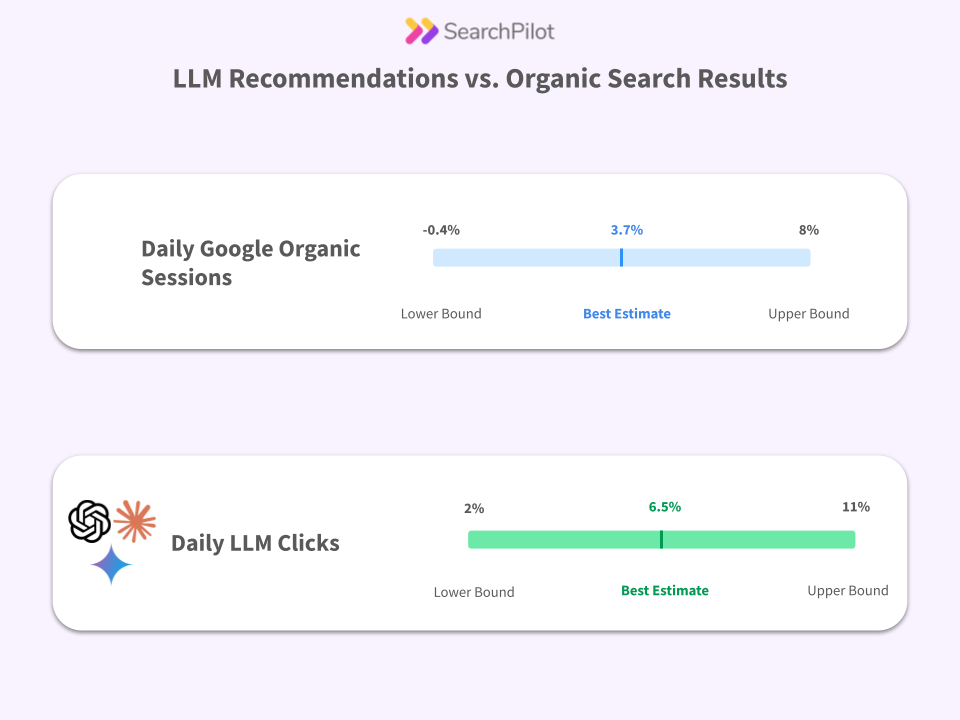There's a valuable debate in the SEO community: what's the right balance between being bold with your vision and rigorously testing your ideas?
Do you need to test every change or suggestion? Or should we just have more conviction and be braver with our ideas? How do you balance safety and speed?
It’s a conversation we welcome. In fact, we’ve long argued that you don't need to test every single change. See this post from 2021 and this one last year on the value of an SEO testing program.
That being said, although bravery is necessary, it’s not sufficient to win in SEO.
This debate isn’t just academic; the belief that SEOs can just be braver misses one of the key challenges they face: getting their recommendations done.
After spending well over a decade running an SEO agency, we saw the same challenges come up time and time again. Two problems, more than any others, were holding talented SEO teams back from hitting their goals: difficulty getting things done and proving the value of the things they did get done.
This has been quantified in research like Aira’s State of Technical SEO report, which showed that these two challenges are the top two facing in-house SEOs.

Digging deeper into the “why”, the main reason is that other teams’ changes are prioritised over theirs, followed by a lack of buy-in from stakeholders (which causes the same outcome).

I've seen it time and again: if you want to get things done in large organisations, the best teams come armed with a solid business case, backed by data, to explain why their proposed change is necessary. Not only that, they can lay out how they've accounted for risks and give a clear picture of the potential upside.
Bravery or data is a false choice
The most sophisticated SEO teams know that they don't need to choose between bravery and data; they use data to fuel their bravery and empower their decisions.
You wouldn’t want a pharmaceutical company to be “brave” with a new drug without clinical trials. Why would you treat a website that generates millions in revenue and is responsible for employing thousands of people any differently?
An F1 team uses telemetry and wind tunnel data not because they lack courage, but because it's the only way to win. That's what SEO testing is: telemetry for your website.
Testing enables bravery
Without testing, you can’t really push your performance to the limit. We’ve written about this before using the analogy of “safety nets”. See the 2x2 from that post below:
The x-axis shows your initial confidence in a change. On the right are the 'no-brainer' changes you'd likely make anyway, while on the left are more speculative ideas you'd only be prepared to try with a test.
The left side of the chart is where winners are made and where bravery is needed.
These are things that are hard to replicate and offer a real competitive advantage. Without testing, you’re stuck doing what everyone else is doing: best practice and zero-sum.
If you really want to be brave and push things to the limit, testing is your tool to do that.
We’ve seen customers be brave while testing
One example stands out in my mind to demonstrate this point. A customer of ours wanted to make bold changes to a particular page template on their site. The changes were radical and brave and aligned with user testing and product goals.
Unfortunately, when they ran the test, it showed a 30% drop in organic traffic. Lucky they had that safety net allowing them to run the brave test!
From here, they were able to iterate on the design and add back in certain elements whose absence caused the drop and ultimately launch a new version that captured both the brave changes they wanted to make and that had no downside on organic traffic.
Conclusion
SEO testing isn’t for everyone. There is absolutely a stage and time for SEO teams to move fast and break things, but that will only get you so far. Being brave gets you to the start line, but testing, being able to reduce perceived risks, and creating compelling business cases are what empower the best SEO teams in the world to get their ideas over the finish line in large organisations. If you want a more detailed walk-through on when to be brave and when to test, I recommend reading this full article: We're doing business, not science.
If you’d like to read real stories of how the best SEO teams in the world are doing SEO testing with SearchPilot, have a look at our SearchPilot testimonials page.

.png)

